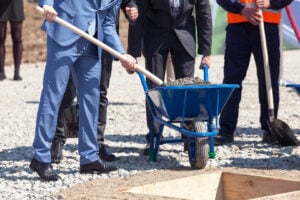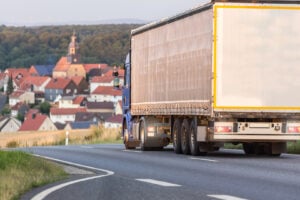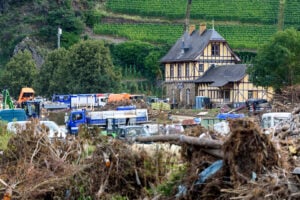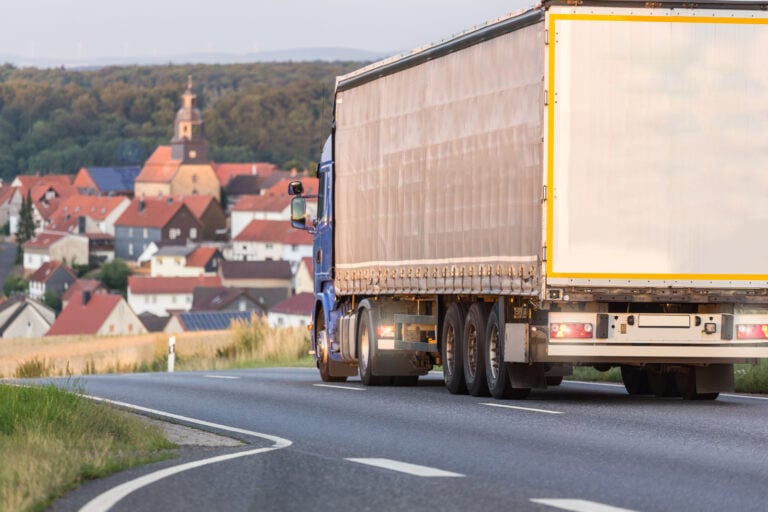Anyone who runs a craft company with small sales somewhere in the countryside knows too well how important it is to be on good terms with the people of the region. After all, they are their most important customers.

In the case of transportation or logistics, this basic idea is often less prevalent. After all, there are practically no walk-in customers here. In addition, the awarding of contracts by the B2B nature often takes place according to sober business management aspects free of emotion. The location is often seen as important here primarily because it offers ideal conditions for transport and logistics due to its location and transport links.
Nevertheless, even in our industry, one should never underestimate how important the regional impact of any company is, and thus also of those from the transport and logistics sector. Not only because there are of course also potential customers here and people who are enormously valuable for recruiting. But also because a company that is literally rooted in the region can always look back on a positive basic standing.
In this sense, for example, a transport company that enjoys a very good reputation “at home” may not automatically attract more customers. But this reputation can act as a real multiplier, radiating far beyond the regional borders and thus attracting more customers. Especially today, when there is always a digital camera somewhere and the way to the Internet is permanently open everywhere.
But how can this standing in the region of the location be improved in our industry? There are a few possibilities. And surprisingly many of them are merely variations on secret recipes of a generally good neighborhood.
A neighborhood-friendly approach and departure design
Not every company has a location from which an optimally developed bypass directly adjoins a federal highway after only a few hundred meters. Very often, however, there are two different routes:
- a longer and/or more complicated path and
- a more direct and/or easier way.
The latter often leads through residential areas due to past political mistakes in road planning. Accordingly, many people in Germany who live near logistics companies are used to a corresponding volume of traffic.
Not everywhere can this be changed. However, where it is possible to divert the company’s own regional traffic to and from the site to less populated routes, companies should do so – and do so consistently. After all, transport traffic of any weight class reduces the quality of life of local residents. For this reason, municipal nighttime driving bans were recently legitimized by the courts.
The signal in a reverse approach: This company will take a slightly longer, perhaps more inconvenient route on purpose so that the people of its region will be less burdened by traffic noise and other impacts. Even if this is not mentioned anywhere in public (which, however, may of course be done), a great many people will notice and appreciate it.
Especially since this “detour” is rarely of any real concern in practice, because it means a delay on a manageable scale.
Comprehensive sponsoring of clubs and organizations
Whether it’s the local bachelor club, the shooting club or the regional soccer team, everything that falls under the umbrella term clubs has been known to struggle with increasing problems for years. Problems that can be traced back both to a general trend reversal in leisure activities and to demographic change – and most recently to the pandemic, which has once again given the situation a completely new quality.
As a result, many clubs, especially those in more rural areas, have long been suffering from a mixture of declining membership and empty coffers. In fact, the latter is often the greater problem of the two.
No company can do anything about the lack of young people except recruit them from its own workforce. However, the financial situation can be remedied in this way, through sponsoring. In fact, our industry is particularly well suited for this, since in many rural areas it is the local companies with the highest turnover and the largest number of employees.
At the end of the day, every sponsorship is an exchange: company name and similar forms of advertising in exchange for money. In sports alone, this can result in an amazing chain of success:
– A team becomes better equipped because of the money,
– this fact and the company name are clearly visible at the tournament,
– spectators arrive on site, others see videos of it on the Internet, perhaps even people from outside deal with it, because the great variety of possibilities in sports betting has long since arrived at every level of performance, and thus even lower leagues have become interesting beyond the region. It is likely that the press will also be present.
All this can happen from a single soccer or other game. At every game, mind you. When sponsoring at such a regional level, the costs are usually much lower than any financial return. And anyway, you can’t put a price tag on the standing in the region mentioned at the beginning.
By the way, it doesn’t just have to be classic sports sponsorship. A good logistics entrepreneur will even specifically look for other alternatives, including support for daycare centers, youth clubs and senior citizens’ events.
Completely unbureaucratic help
The floods on the Ahr River in the summer of 2021 were an unparalleled catastrophe. However, many agree on how much worse the aftermath in particular could have been if companies of all sectors and sizes had not provided assistance.

No matter whether it was the release of employees for the cleanup, donations of money and materials or the active commitment (at their own expense) with company-owned equipment. The small river once again showed what companies can achieve.
For our industry, there are several things to know here:
- emergencies exist everywhere and in various forms, not only due to severe weather.
- in almost all such emergencies, it comes down to storage areas, fast and sensible distribution of relief goods and transport.
Therefore, there are hardly any better companies, so to speak, that can provide assistance than those from the transport and logistics industry. Simply because everything that is needed in such situations is part of the absolute brand essence of our industry.
Of course, the idea of helping should come before any conceivable strengthening of the location, that must be clear. The advertising effect is automatic. It is already enough if the company name is legible on the T-shirts of helpers and the transport vehicles. For the remainder again present ones, the Internet and the media provide.
But again, entrepreneurs should like to think more broadly in this regard. It doesn’t only have to be emergencies that deserve the name disaster. Help is always needed, even on a small scale. Even if it’s only the municipal hall that needs to be renovated, because of which the local clubs currently have no roof over their heads. It is precisely in situations like these, which do not give rise to a great wave of willingness to help, that companies can score points by providing unbureaucratic assistance.
Just do it when the state can’t or won’t
Every entrepreneur should know that company structures can often act better, faster and more effectively than those in state hands. A case that actually occurred years ago in northern Germany illustrates how companies can use this ability to improve their standing.

Directly adjacent to the premises of a smaller transport company in a small town was the municipality’s only significant children’s playground. However, it was in a deplorable state due to vandalism and neglect. The city could credibly argue that it had no money for renovation. The idea was therefore to remove all the equipment and plant the site with grass.
The company did not think twice, but took a look at the most important standard in this respect, explained the plan in the town hall and went into action. They fenced off the piece of land next to the playground from the rest of the company’s premises and the employees built a new playground there – all at the company’s expense and in accordance with the same specifications that apply to municipal playgrounds. After a few weeks, what the municipality had not been able to bring itself to do for years was opened.
How the company name was perceived in the city in the future, the inclined reader can certainly imagine. And also this: There are always and everywhere situations in which local politics cannot act. Any company that then takes the initiative automatically creates a completely different perception. In the example mentioned, even the politicians were probably glad that someone took up the matter.
In summary
For the daily business of our industry, the people in a region may play a lesser role than in other sectors. But even if the regional location sets other priorities from a purely business perspective, no transport and logistics company should neglect how effective a positive image is in the immediate company home. Especially today, when every good – and bad – deed can radiate across the globe through the Internet.









